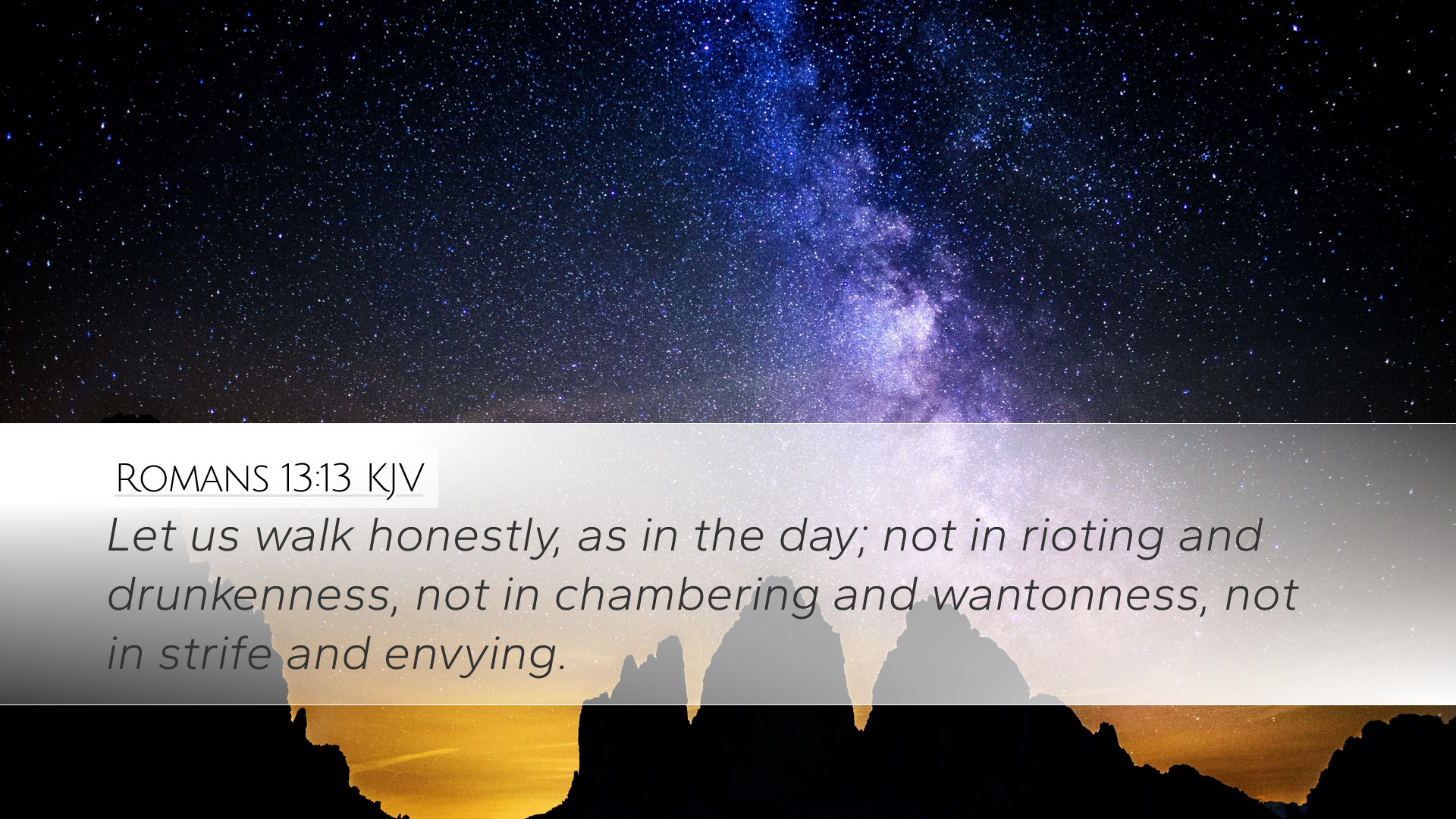Old Testament
Genesis Exodus Leviticus Numbers Deuteronomy Joshua Judges Ruth 1 Samuel 2 Samuel 1 Kings 2 Kings 1 Chronicles 2 Chronicles Ezra Nehemiah Esther Job Psalms Proverbs Ecclesiastes Song of Solomon Isaiah Jeremiah Lamentations Ezekiel Daniel Hosea Joel Amos Obadiah Jonah Micah Nahum Habakkuk Zephaniah Haggai Zechariah MalachiRomans 13:13
Romans 13:13 KJV
Let us walk honestly, as in the day; not in rioting and drunkenness, not in chambering and wantonness, not in strife and envying.
Romans 13:13 Bible Commentary
Commentary on Romans 13:13
Romans 13:13 states: "Let us walk properly, as in the daytime, not in orgies and drunkenness, not in sexual immorality and sensuality, not in quarreling and jealousy." This verse is part of Paul's broader exhortation regarding ethical living, particularly in relation to the Christian's identity and conduct in the midst of a secular world.
Contextual Overview
This passage arises within the greater context of Romans 13, where Paul addresses his readers on the importance of submission to governing authorities and the moral obligations that flow from a life lived under the lordship of Jesus Christ. In the preceding verses, Paul emphasizes love as the fulfillment of the law (Romans 13:8), which serves as the backdrop for his call to moral purity in verse 13.
The Necessity of Proper Conduct
Paul begins with a clear and urgent appeal: “Let us walk properly.” The term “walk” suggests a way of life or conduct that should be characterized by integrity and moral correctness. It contrasts sharply with the unruly behaviors prevalent in the surrounding pagan culture.
Daylight vs. Darkness
Paul’s metaphor of walking "as in the daytime" implies a life lived in the open, in light of truth and accountability. According to Matthew Henry, this daylight symbolizes living in the light of Christ, which exposes sinful behavior and promotes righteous living. In juxtaposition to "orgies" and "drunkenness," such behaviors are indicative of living under the darkness of sin, where indulgence becomes the norm.
Specific Moral Exhortations
The apostle Noah Morrison categorizes the sins Paul warns against into three clusters: public debauchery, private moral failures, and social strife.
- Public Debauchery: "Orgies" and "drunkenness" reflect communal revelries that lead to moral decay. According to Albert Barnes, such excesses were not only common in Greco-Roman culture but were intrinsic to the worship of many pagan deities, where sexual immorality and consumerist excess were celebrated.
- Private Moral Failures: Paul includes "sexual immorality" and "sensuality," which refer to acts that undermine the sanctity of marriage and personal integrity. Adam Clarke emphasizes that these acts detract from the believer’s witness and are destructive to the individual and community at large.
- Social Strife: The inclusion of "quarreling and jealousy" indicates that interpersonal relationships are equally important to God. Matthew Henry points out that these sins often arise from a lack of love and respect for others, which tarnishes the Christian testimony.
Theological Implications
This passage reflects deeper theological truths regarding sanctification and the call to holiness in the life of the believer. Paul asserts that the transformation wrought by the Holy Spirit necessitates a change in behavior. As Adam Clarke notes, true believers are not under the dominion of sin but are to live as representatives of Christ in a fallen world.
Practical Applications
The exhortation of Romans 13:13 remains relevant for churches today. It calls for a conscious decision to distance oneself from behaviors that are not only sinful but that also damage the communal and social fabric of the church.
- Self-Examination: Believers are encouraged to routinely evaluate their conduct and motivations, ensuring they align with godly principles.
- Community Accountability: The church should promote an environment where accountability is fostered, guiding one another to pursue righteousness and moral integrity.
- Witness to the World: As the church engages with the world, it must present a counter-cultural witness that glorifies God, thus demonstrating the transformative power of the Gospel.
Conclusion
Romans 13:13 serves as a powerful reminder of the call to holy living. Paul’s charge for believers to “walk properly” reflects a life illuminated by the grace of God, distinctly different from the surrounding culture. The commentary insights from Matthew Henry, Albert Barnes, and Adam Clarke reinforce the importance of righteous living, both for personal sanctification and as a testimony to the world. As we navigate our contemporary context, may we heed this exhortation and strive to live faithfully in the light of Christ.


